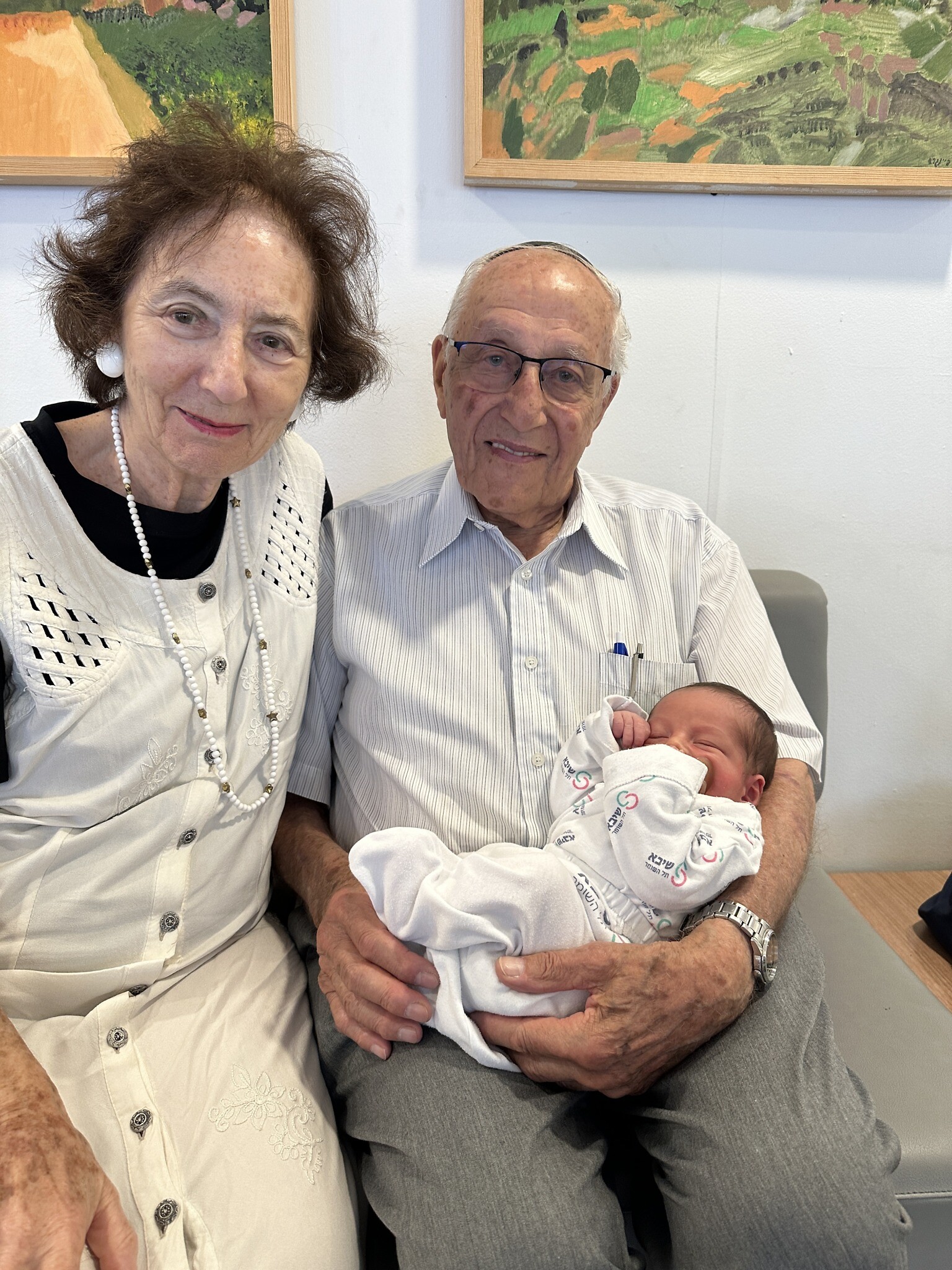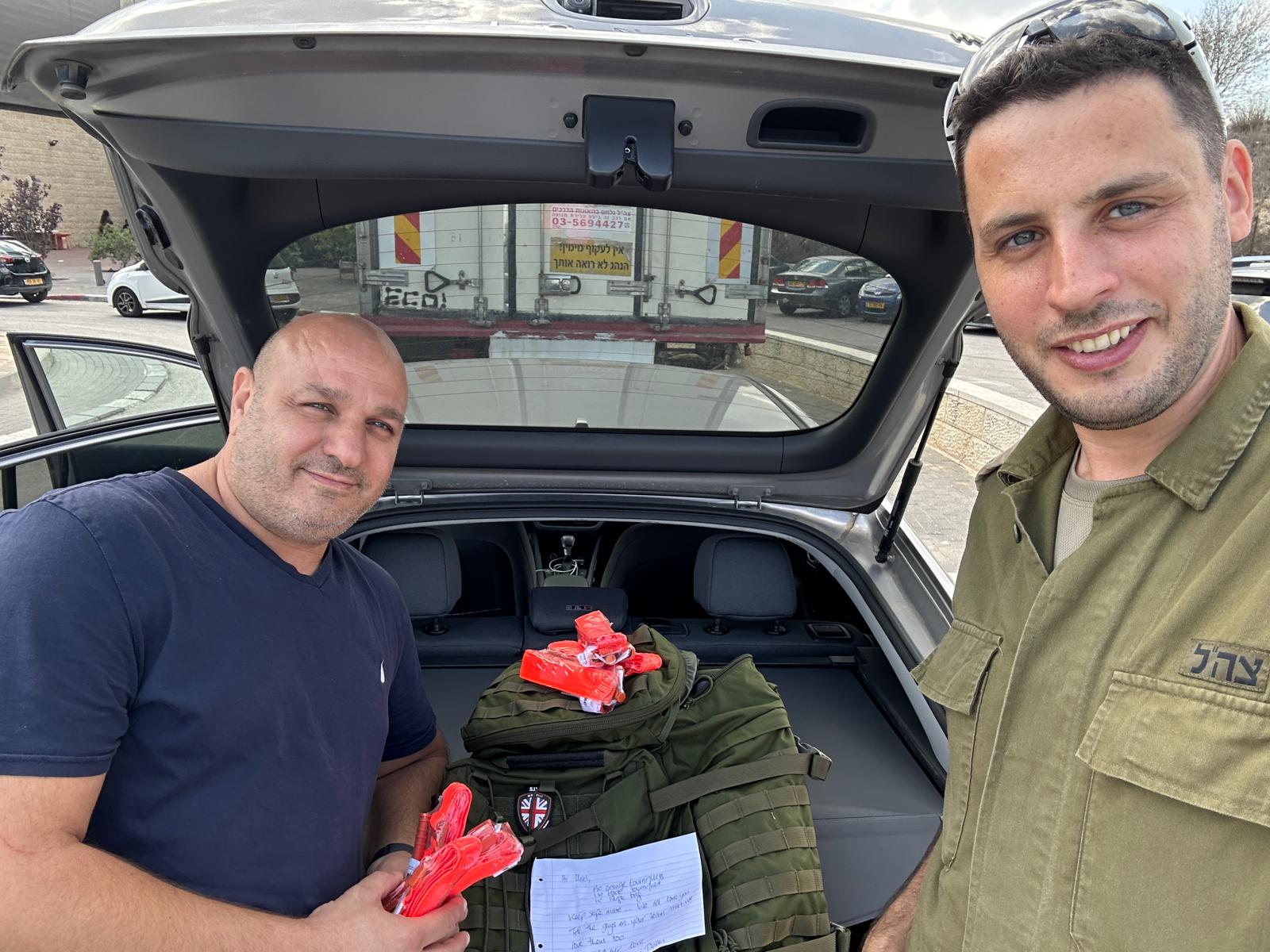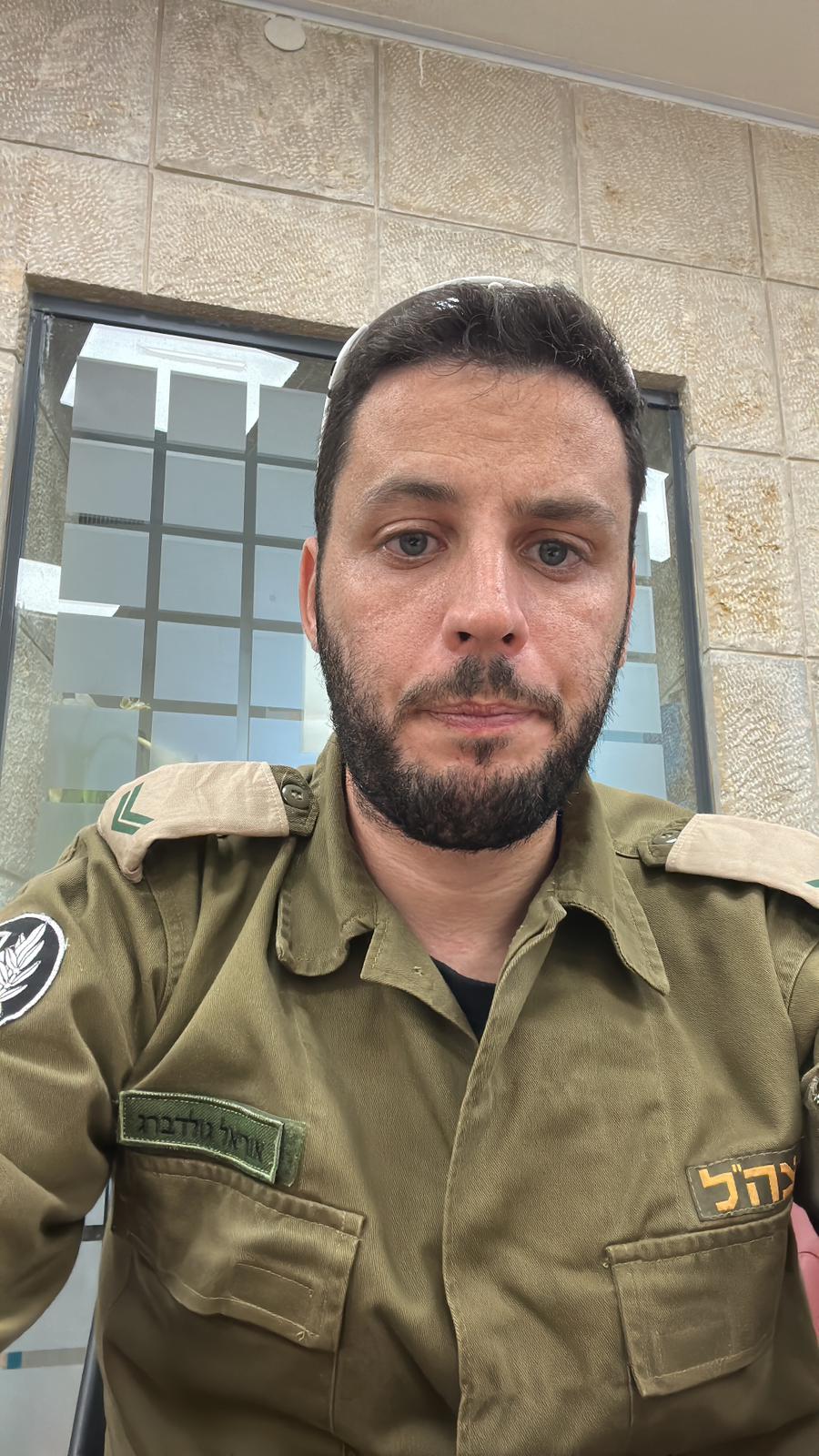The survivor, his grandson and the enduring struggle for Jewish survival across generations
EXCLUSIVE: Holocaust survivor Manfred Goldberg and his IDF reservist grandson Uriel Goldberg on passing the torch in the fight against Jewish persecution.
“There’s no one else I would rather do an interview with,” says IDF reservist Uriel Goldberg, as he adjusts his microphone to take part in an extraordinary online discussion with me and his grandfather, Holocaust survivor Manfred Goldberg.
Uriel, 31, a reservist paramedic with the IDF, is talking to Jewish News from his army base in Israel. His 93-year old grandfather, who lives in Hendon, is a beloved Shoah survivor and educator.
The symbolism of having a grandson serving in the IDF defending the only Jewish state is not lost on Manfred. He says he “couldn’t feel prouder about his eldest grandson, Uriel. “He’s a remarkable young man and he certainly has leadership abilities. It seems to come naturally to him. He has emerged as someone whose views are wanted. He’s coherent, literal, clear, and factual. He tells things as they are, which I’m very happy about.”
Born on 21 April 1930 in Kassel, Germany, Manfred and his family were unable to escape to join his father in Britain. Manfred spent the Holocaust in a number of concentration and labour camps, tragically losing his younger brother in 1943. He was finally liberated from Neustadt in Germany on 3 May 1945.
Uriel Goldberg made aliyah from Hendon when he was 19 years old. For many years he was a paramedic for Magen David Adom and now works as a public affairs manager in Israel for US-based fintech (financial and technology) bank Cross River.
Defending Israel as the eldest grandson of a Shoah survivor is hugely symbolic for the two men. The deep bond between them is evident.
Uriel says: “We’ve always been close – even though we live in different countries. They come to Israel, to Netanya and we speak all the time on Zooms and WhatsApp video calls.”

Manfred says: “I can tell you one instance where Uriel was incredibly helpful. Many years ago, with my wife by my side, I paid my first visit to Yad Vashem. After a few minutes I was so emotionally overcome that I burst into tears and had to leave. For decades I could not bring myself to return until Uriel offered to accompany my wife Shary and me. He said he would do his best to give me the strength to do this and indeed he did. As a result of Uriel’s support I managed to get through it.”
Uriel, smiling, says his grandfather “represents strength, being able to go through what he and obviously many others went through and to come out of it and to carry on with life and not to give up and to build a family. It’s something which is something to emulate. I hope none of us will go through the same struggles, but it definitely shows us how strong the humans will to live and to continue is.”
On 7 October, Uriel and his wife Tamar, whose parents are from Uzbekistan, were staying with his saba and savta in Netanya. “They woke up at 6am because of the baby. And at 6.30am our phones started exploding from alerts. Quickly, we understood what was going on. Also, the unit from the army told us to be on alert to be ready. So we went back home to be prepared. And then within an hour or two, I was already called up from Shabbat late morning. And I’ve been here since.”

Uriel is in a search and rescue unit based in east Jerusalem. He says: “it’s a unit which day to day, we’re on alert, ready, waiting. Our role is to provide the response of any rocket attack. So if a rocket hits a building anywhere in the area and there’s a need for rescue, that’s our specialty.
“That’s what we’re facing at the moment. In the meantime, we’re doing a lot of civilian tasks. So there are a lot of people who have evacuated from the north and the south, and especially for those from the south who need assistance in the hotels. We’re there to give them the reassurance that the IDF is there for them and that we’re there to help.”
Manfred says 7 October was “stunning in several respects. It was the morning of Simchat Torah, which is one of the happiest days in the Jewish calendar. Uriel had answered his phone and found out that thousands of rockets were being shot into southern Israel and it sounded extraordinarily dramatic and cruel.”
“We were just getting used to the pleasure and privilege of becoming great grandparents to a sabra. And out of the blue, this tragic event unfolded.”

Manfred says that when he arrived in the UK in 1946, “politicians were saying loudly and clearly, never again, never again. And I really believed that. I did not dream that I would ever again experience either antisemitism or, unbelievably, Holocaust denial.”
He adds: “One of my revenges on the Nazis is being able to build a lovely family. Israel is living up to God’s promise that it should be a light unto the nations. If you look at things objectively, sadly the world appears to be too blind to see it.”
Uriel says “It’s everyone’s responsibility to do what they can for the Jewish people, each on their own level, each in their own way. But I think I’ve been lucky and blessed to be able to make aliyah and move to Israel.”
Since the outbreak of the Israel-Hamas war, the Jewish diaspora has fundraised furiously to send essential medical and tactical equipment to IDF soldiers.
In response, Uriel, who together with his unit are personal recipients of that generosity, says: “We appreciate everything that’s been done and everything that has been sent. As someone in the IDF to receive equipment and gifts and messages and letters from people we do know, people we don’t know, showing their support and their feeling and the need which they have to be part of the war on behalf of Israel and to do what they can – has just been heartwarming.”
Pointing to behind the glass wall behind him, Uriel says many of those letters are posted up. “It has given us strength. When we’re here for two, three weeks in a row without going home, doing whatever we’re doing from early in the morning to late at night. It gives us the strength. We’re not doing it just for our own family here. We’re doing it for the wider community in Israel and outside of Israel.”
Manfred agrees: “Overnight, when faced by a common emergency, the unity shown by the country of Israel, by the people there, has been extraordinary – an example to the world of what the word unity truly meant or means. It is heartwarming. Please God it should continue. Israel needs to be unified.”
Uriel believes that, following the Holocaust, what Israel is doing is “more than just surviving. I think also what my saba did after the war was a stage after surviving, It was also living. And growing up from the age of 15 until 75, when he started speaking about his experiences, he wasn’t a survivor. None of his close family or friends knew or had known what he’d been through.
“He didn’t show anything externally. And it was only a couple of years ago when he actually started speaking, that people realised what he had been going through. And I think that what we’re doing here today (in Israel) is more than just surviving. We’re not here just to be here. We’re here to live, we’re here to grow and to carry on the traditions as well.”
As our conversation draws to a close, Manfred Goldberg asks if he can send a personal message to his grandson. “I would address my message to God. May he protect you and all the brave soldiers of the country from harm, and may Israel succeed in its quest to ensure that such an atrocity can never ever be repeated.”
Manfred adds: “I certainly feel that the country of Israel is absolutely vital for the continuity of the Jewish people. May the Almighty keep it mighty and strong in order to ensure that the Jewish people have one little plot on earth in which they can feel safe.”
Manfred says Uriel living in Israel, serving with the IDF and blessing him with his first great grandchild is the “ultimate legacy in a tale of survival.”
As for Manfred and his wife Shary going to Israel, he says he will have to wait and see. “Maybe, maybe one day. Who knows?”
Uriel urges Manfred to check his phone for new photos of baby Itai that he’s just sent via Whatsapp. Smiling, Uriel then sends a quick final message to Jewish News to say he’s flying to London the following evening to see his saba. It’s a surprise.

Thank you for helping to make Jewish News the leading source of news and opinion for the UK Jewish community. Today we're asking for your invaluable help to continue putting our community first in everything we do.
For as little as £5 a month you can help sustain the vital work we do in celebrating and standing up for Jewish life in Britain.
Jewish News holds our community together and keeps us connected. Like a synagogue, it’s where people turn to feel part of something bigger. It also proudly shows the rest of Britain the vibrancy and rich culture of modern Jewish life.
You can make a quick and easy one-off or monthly contribution of £5, £10, £20 or any other sum you’re comfortable with.
100% of your donation will help us continue celebrating our community, in all its dynamic diversity...
Engaging
Being a community platform means so much more than producing a newspaper and website. One of our proudest roles is media partnering with our invaluable charities to amplify the outstanding work they do to help us all.
Celebrating
There’s no shortage of oys in the world but Jewish News takes every opportunity to celebrate the joys too, through projects like Night of Heroes, 40 Under 40 and other compelling countdowns that make the community kvell with pride.
Pioneering
In the first collaboration between media outlets from different faiths, Jewish News worked with British Muslim TV and Church Times to produce a list of young activists leading the way on interfaith understanding.
Campaigning
Royal Mail issued a stamp honouring Holocaust hero Sir Nicholas Winton after a Jewish News campaign attracted more than 100,000 backers. Jewish Newsalso produces special editions of the paper highlighting pressing issues including mental health and Holocaust remembrance.
Easy access
In an age when news is readily accessible, Jewish News provides high-quality content free online and offline, removing any financial barriers to connecting people.
Voice of our community to wider society
The Jewish News team regularly appears on TV, radio and on the pages of the national press to comment on stories about the Jewish community. Easy access to the paper on the streets of London also means Jewish News provides an invaluable window into the community for the country at large.
We hope you agree all this is worth preserving.





















